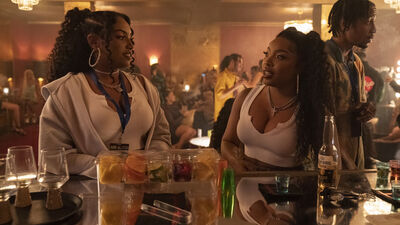Now an official rap group, Mia Knight (KaMillion) and Shawna Clark (Aida Osman) are set to open on white rapper Reina Reign’s (Kat Cunning) tour. Their manager Chastity (Jonica Booth) is with them, though she is struggling to define her role or worth in the face of smarmy opposition from Reina’s producer Francois (Jaboukie Young-White, finding new levels of elitist villainy on television). Shawna and Mia are excited to start on a new chapter of their dreams, but other issues continue to cloud their view of the future. Reina barely bothers to mask elitist and racist contempt for Mia and Shawna’s contributions to the tour; the writing does a great job highlighting Reina’s appropriation of black music and culture while racking up laugh after laugh. Mia still hasn’t found firm footing with her child’s father Lamont (RJ Cyler); they aren’t together, but love their daughter equally, and it was his terrific producing skills that helped the pair’s “Seduce and Scheme” to become a hit. Shawna is being investigated for credit card fraud by law enforcement; this subplot is a direct reference to the legal troubles of JT, a member of City Girls, the Miami female rap duo who serve as the inspiration for “Rapsh!t.”

There are significant changes in the structure of season two. I’m appreciative of the writers opting for less social media-as-framing narrative devices this season. Most of the first season was lensed through Instagram Stories, FaceTime conversations, TikToks, etc. While I fully understand the prominent role social media clout plays in hip-hop, the grumpy Millennial in me, who neither uses nor knows how to use most of the aforementioned apps (I don’t even like FaceTime; just talk to me on the phone like it’s 2004), found it distracting, and sometimes confusing. There’s less of that this season, and the amount of FaceTime calls or Instagram Lives don’t interrupt the flow of the story.

The writing in season two displays the vibrant specificity of a world we, the audience, get to explore. I know very little about the intersection of rap stardom and social media, but its exploitative nature seems very similar to the struggles writers have in getting the attention of editors and publications, and having to constantly advertise our work on social media. I’m not an aspiring rapper, but few things are as relatable as Shawna’s sigh of disgust when her bank notifies her that her checking account has dipped below $25, for the tour pays only in exposure. The craven nature of the recording industry and its impact on vulnerable artists is explored in, frankly, shocking ways this season, creating a spiderweb of potential discussions about mental health, the precarity of life as an artist, and prejudice against mental illness in communities of color. Most of the themes explored in the first six episodes of season two can be extrapolated to most people’s lives; the precision of the writing makes these stories even more engaging, and that’s a true victory for the writers’ room.

